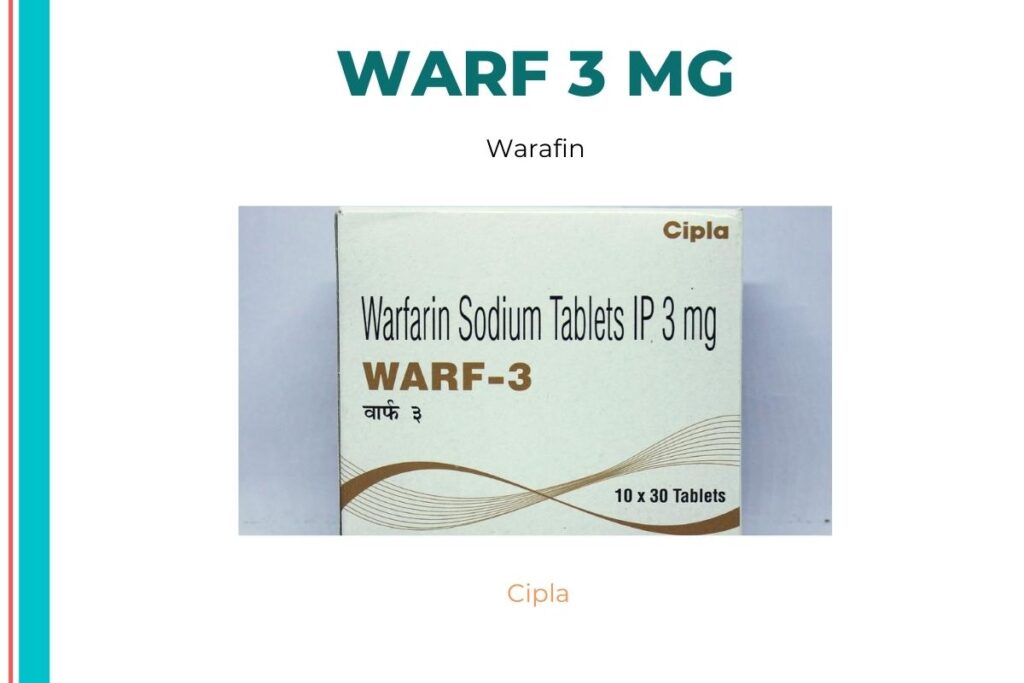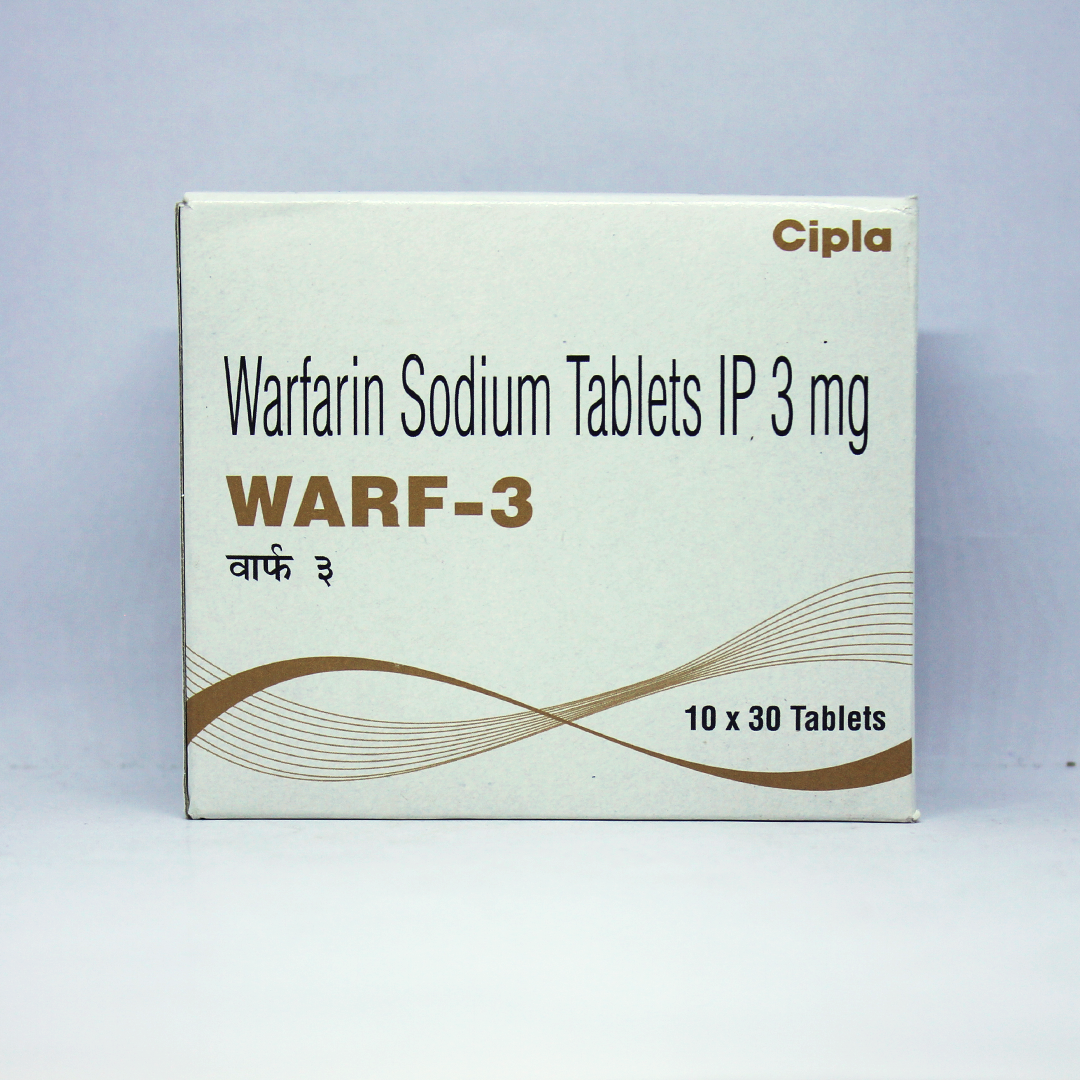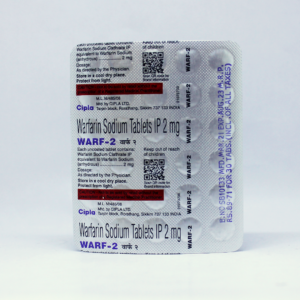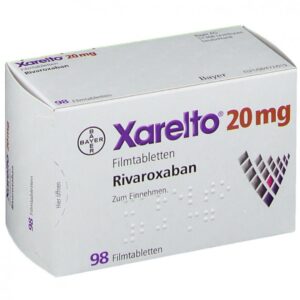Warf 3 mg
Warf 3 mg is a blood thinner that belongs to the anticoagulant class of medicines. By lowering the formation of a blood clot, Warf 3 mg is primarily used to prevent and treat deep vein thrombosis (blood clots in leg veins) and pulmonary embolism (blood clots in the lung). Deep vein thrombosis is a medical disorder that causes blood clots to form in the deep veins of the legs. A pulmonary embolism occurs when a blood clot plugs one of the lungs’ arteries.
Warf 3 mg acts by reducing the activity of vitamin K, which inhibits the development of clotting factors. This prevents the conversion of fibrinogen (a soluble protein) to fibrin (an insoluble protein) and thus the formation of blood clots.
Take Warf 3 mg whole with a glass of water, preferably with or without food. It should not be crushed, chewed, or broken. Based on your medical condition, your doctor will tell you how often you should take your medications. Unusual bleeding or a rash may occur in certain people. The majority of these Warf 3 mg side effects do not require medical care and will go away with time. Please visit your doctor if the side effects persist or worsen.
Please inform your doctor if you are allergic to Warf 3 mg or any other medications. It is recommended that you see a doctor before using Warf 3 mg if you are pregnant or breastfeeding. Before taking Warf 3 mg, tell your doctor if you have a stomach ulcer, kidney or liver issues, high blood pressure, or bleeding difficulties. Because Warf 3 mg prolongs bleeding time, having frequent ‘INR’ or prothrombin time tests to assess your blood-clotting time would be beneficial. To avoid excessive bleeding from the injury location, be cautious when shaving and cleaning your teeth.

Warf 3 mg’s Applications
Blood clot prevention
Medicinal Advantages
Warf 3 mg is a blood thinner that belongs to the anticoagulant class of medicines. By lowering the formation of a blood clot, Warf 3 mg is primarily used to prevent and treat deep vein thrombosis (blood clots in leg veins) and pulmonary embolism (blood clots in the lung). Warf 3 mg acts by reducing the activity of vitamin K, which inhibits the development of clotting factors. This prevents the conversion of fibrinogen (a soluble protein) to fibrin (an insoluble protein) and thus the formation of blood clots.
Use Instructions
Take Warf 3 mg exactly as directed by your doctor. Try to take Warf 3 mg at the same time every day to maintain consistent warfarin levels in your blood. It is normally suggested that you take Warf 3 mg at 6 p.m. for the best results.
Store in a cool, dry location away from direct sunlight.
Warf 3 mg Side Effects
Warf 3 mg, like any drugs, can produce adverse effects like irregular bleeding or a rash on the skin. If you experience a severe skin rash, see your doctor right away since it could be the result of calciphylaxis (calcium accumulation in small blood vessels of the skin and fat tissues), which can lead to painful skin ulcers, blood clots, and serious skin infections. Calciphylaxis is a serious condition that affects patients with chronic renal disease. The majority of these Warf 3 mg side effects do not require medical care and will go away with time. Please visit your doctor if the side effects persist or worsen.
Drug Recommendations
In children, it should be used with caution. Hair loss may occur if you use Warafin for a long time. While using Warafin, you should get regular blood tests to see how long it takes your blood to clot and how high your platelet count is (blood cells). If you experience a severe skin rash, see your doctor right away since it could be the result of calciphylaxis (calcium accumulation in small blood vessels of the skin and fat tissues), which can lead to painful skin ulcers, blood clots, and serious skin infections. Please contact your doctor if you have high blood pressure, renal, liver, or heart problems before using Warafin so that the dose can be adjusted appropriately. Warafin has the potential to induce major adverse effects such as skin tissue death (skin necrosis or gangrene). If you suffer pain, color, or temperature changes in any part of your body, or if you have ‘purple toes syndrome,’ call your doctor. Inform your doctor that you are taking Warafin before undergoing any type of surgery. It’s possible that your doctor will advise you to discontinue taking Warafin. Warafin is a pregnancy category D drug that might result in birth abnormalities or miscarriage. So, if you’re pregnant or planning to get pregnant, or if you’re a nursing mother, notify your doctor you’re taking Warafin. In patients with severe anemia (low RBC count), malignancies (any malignancy), or trauma, Warafin should be administered with caution (injuries).
Interactions Between Drugs
Interactions between drugs: Antidepressants (nortriptyline, amitriptyline), antifungal drugs (fluconazole, miconazole, ketoconazole), antibiotics (ciprofloxacin, erythromycin, latamoxef, griseofulvin, metronidazole), antidiabetic drugs (glucagon, tolbutamide, phenformin), heart-related medicines (quinidine, amiodarone, propaf (ethchlorvynol, glutethimide)
$name with cranberry juice, noni juice, grapefruit juice, pomegranate juice, and green tea may have an interaction. Coriander, cabbage, spinach, broccoli, collard greens, kale (leaf cabbage), black licorice, turnip greens, avocados, and brussels sprouts are high in vitamin K and may interfere with Warafin function. Also, avoid drinking alcohol because it raises the chance of bleeding.
In individuals with kidney, liver, or bleeding disorders, as well as peptic ulcers and high blood pressure, use with caution.
Safety Suggestions
ALCOHOL
It is recommended that you avoid drinking alcohol while taking Warafin because it may increase your risk of bleeding.
PREGNANCY
Warafin is a pregnancy medication classified as Category D. It means that if Warafin is given to a pregnant woman, it can harm the fetus. It should not be administered to pregnant women who have artificial heart valves because thromboembolism is a serious danger.
BREAST FEEDING
Although warafin is not present in breast milk, it should be used with caution if your doctor prescribes it.
DRIVING
In most cases, warafin has no effect on your ability to drive or operate machines.
LIVER
If you have a history of liver disease or condition, use Warafin with caution. Your doctor may alter the dose if necessary.
KIDNEY
If you have a history of Kidney disease or condition, use Warafin with caution. Your doctor may alter the dose if necessary.
No habit formation
Advice on Diet and Lifestyle
Avoid making any dietary modifications without first seeing your doctor.
Because Warafin may diminish Vitamin K levels in your body, eat foods high in vitamin K (liver, leafy green vegetables, or vegetable oils).
Warafin may interact with cranberry juice, grapefruit juice, noni juice, and pomegranate juice, causing unpleasant side effects. As a result, while taking Warafin, try to stay away from these juices. Alcohol use raises the risk of stomach ulcers and bleeding.
Recommendations
To examine your blood clotting time, you need have a routine platelet count, factor V assay, fibrinogen level test, prothrombin time test (PT or PT-INR), and the INR, or international normalized ratio.
Additional Information: This item is non-refundable.
Concerns of Patients
Deep vein thrombosis (blood clots in the legs) is a medical disorder that occurs when blood clots form in the deep veins of the legs. Leg pain or edema are common symptoms. Pulmonary embolism (blood clots in the lungs) is a chronic illness that arises when blood clots in the legs or other parts of the body burst and travel to the lungs. Cough, chest pain, and shortness of breath are all symptoms of pulmonary embolism.
FAQs
It is not suggested that you take aspirin with Warafin since the two drugs together may raise the risk of bleeding. Please see a doctor right away if you notice blood in your urine or stools, dizziness, unusual bleeding or bruises, vomiting, weakness, or a headache. If you need to take these medications together, talk to your doctor about how the dose should be changed so that you can take them safely.
Vitamin K-rich foods like coriander, red cabbage, spinach, broccoli, collard greens, kale (leaf cabbage), black licorice, turnip greens, avocados, parsley, brussels sprouts, and green tea should be avoided since they may reduce Warafin’s effectiveness. Additionally, cranberry juice, alcohol, and grapefruit juice should be avoided because they increase the risk of bleeding.
If you take warafin for a long time, you can lose your hair.
It is not suggested that you discontinue taking Warafin without first consulting your doctor, since this could make your situation worse. As a result, take Warafin for as long as your doctor recommends.
It’s usually not a good idea to get a tattoo or a body piercing while taking Warafin because it can cause bleeding and infection. If you still want to go ahead, talk to your doctor about adjusting your dose or getting antibiotics, and let the piercer or tattooist know ahead of time that you’re on blood thinner medication.
Warafin should be stopped within 24 hours of surgery or birth since it can increase the risk of bleeding. Please advise your doctor that you are taking Warafin before undergoing any dental or surgical procedures.
To assess your blood clotting time, you can undergo a platelet count, factor V assay, fibrinogen level test, prothrombin time test (PT or PT-INR), and the INR, or international normalized ratio.






Leave a Reply
You must be logged in to post a comment.